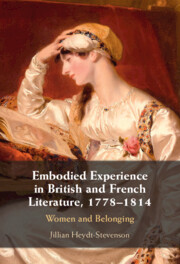Acknowledgments
I have many people to thank, for many people have allowed me to belong with them in study, conversation, scholarship, friendship, and love. I have joyfully lived with others the thesis of my book. At the University of Colorado, I am grateful to my colleagues Jeffrey Cox and Thora Brylowe, whose intellectual and emotional support was – and continues to be – incalculable. How you remained generous up to the last moment can only be clear to those who know how extraordinary you both are. In reading groups, in response to presentations, in their support for my scholarship, and during so many times when they just made my life better by being extraordinary colleagues, I deeply thank other colleagues from multiple departments: Tiffany Beechy, Christopher Braider, Brian Catlos, Jeffrey Deshell, Katherine Eggert, Jane Garrity, Emily Harrington, Cheryl Higashida, Kelly Hurley, Karen Jacobs, Peter Knox, William Kuskin, Catherine Labio, Warren Motte, Helmut Muller-Sievers, Teresa Nugent, Elisabeth Sheffield, Nuria Silleras-Fernandez, Maria Windell, Laura Winkiel, Nicole Wright, and Paul Youngquist.
Lynn Festa and Sonia Hofkosh have been the best companions one could hope for on a journey toward and with things. We began this trip together while in England at a Jane Austen conference. Thank you for the laughter and the knowledge. The two of you, along with Julie A. Carlson, Angela Esterhammer, Devoney Looser, Anne Mellor, Padma Rangarajan, and Sophie Thomas, offer a dazzling octet that has provided a model for me of collegiality and scholarship. My admiration for your indefatigable drive, your ethics, and your inspirational work knows no bounds.
Other scholars and friends have throughout the years taken time and energy to respond to this book and other aspects of my work. I cannot thank Tim Morton enough: Your influence on me as a friend and scholar is immeasurable. It was a pleasure and distinction to receive Ed Dimendberg’s advice early in this project’s genesis. Thank you for your careful reading of and suggestions to my manuscript. I hope I have fulfilled the promise you saw in this work. I continue to be privileged to know and to learn from many scholars in the wide eighteenth-and nineteenth-century community: Suzanne L. Barnett, Bill Brown, Julia S. Carlson, David Clark, Ashley Cross, Roxanne Eberle, Joel Faflak, Michelle Faubert, Mary Favret, Tim Fulford, William Galperin, Michael Gamer, Eric Gidal, Colin Jager, Julie Kipp, Greg Kucich, Mark Lussier, Deidre Lynch, Michael Macovski, Maureen McCue, Julie Park, Judith Pascoe, Alexander Regier, Nick Roe, Peter Sabor, Richard Sha, Kate Singer, Jane Stabler, Charlotte Sussman (my former colleague and a wonderful mentor), Dan White, and Julia Wright. I extend my appreciation to Bruce Graver for a long friendship and for carefully reading this manuscript.
At CU Boulder, several of our former graduate students, now all dear friends and successful colleagues, indefatigably supported my research, especially Peter Hutchings, who read multiple versions of the book, always with insight, intelligence, and precision. I am grateful for your faith in me, for your ability to lighten the most worrisome circumstances, and for sharing your extensive acquaintance of France with me: I can confidently say that you understand belonging with. Bringing extensive knowledge and reading to my work, Kurtis Hessel, John Leffel, Kirstyn Leuner, Deven Parker, Terry Robinson, Michele Speitz, and Dana Van Kooy – sharp intellects all – continually kept me learning more, and Terry, you introduced me to so many crucial references that I cannot name them all or fully express my appreciation. I’m also grateful to my more current graduate students Hannah Blanning and Sarah Schwartzman Ramsey: Reading Spinoza and other philosophers with you and learning about how literary works express embodiment helped inform this book and brought enormous pleasure into my life. Additionally, I am grateful for the help you both offered in preparing this manuscript. I express my gratitude as well to Cecile T. Rebolledo.
Many thanks to my anonymous readers: I have never received such insightful, thorough, and far-reaching guidance as I did from them. I am deeply indebted to Bethany Thomas, James Chandler, and George Laver at Cambridge University Press. I am also grateful for the expertise editing of Balamuthukumaran Pasupathy and Penny Harper. I need more eloquence than I have to thank Élisabeth Leprêtre and also Emmanuelle Riand, who is now Directrice des Musées d’Art et d’Histoire, Culture et Patrimoine Ville du Havre, as well as the staff there, my friend, Mike McGee, and the owners of private collections in France who allowed me to spend hours in their homes and to take photographs of their carefully collected and curated Paul et Virginie objects.
Only my closest friends and family know what this book means to me and the energy I put into it. I extend my warmest and most loving gratitude to Joy Lanzano, who knows me the best – your wisdom and our long hikes together helped me through. Damaris Methner, I’m at a loss to articulate how much I value and appreciate your wisdom: Thank you for believing in this book. Liz Janowski, Phyllis Levy, and Robert Barris – you taught me how to put belonging with into delightful and successful practice. Vernon Minor, thank you for the early years in Rome and Florence. I’m grateful to my son, Will (who taught me more than anyone or any book could), and daughter-in-law, Maia Bennett, who watched some of this unfold. And, last but most, thank you, John Stevenson, for reading and commenting on so many drafts we lost count, and yet never losing patience. I could not have written this book without you.

